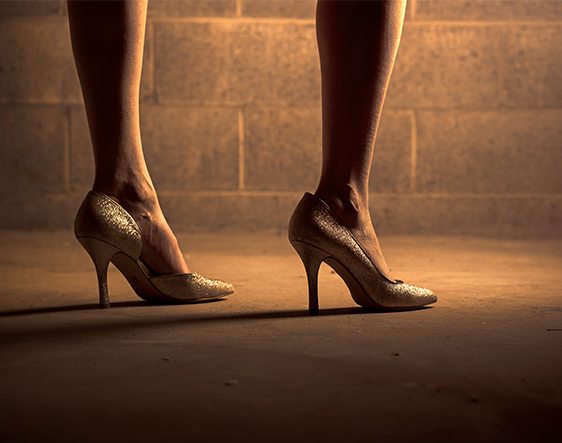The most common health problems caused by high heels are felt in your feet. The highest heels – over five inches – place the most strain on the body. The higher the heel, the greater the pressure on the front of your foot. With comment from AXA PPP healthcare’s lead physiotherapist, Jan Vickery
A 5cm (just under 2”) heel increases the pressure on the ball of your foot by about 52 percent with each step you take. Wear an 8cm heel (just over 3”) and the pressure increases to about 79 percent. The result? Unnatural loading of the forefoot can lead to hammer toe deformities, bunions, callouses and thickening of the nerves between the toes (Morton’s neuroma),” says Jan. If you wear high heels daily you may also find that your Achilles tendon at the back of your ankle changes, becoming tight, thickened and shortened.
What could go wrong?
The strain doesn’t stop at your feet. High heels tend to push your body weight forward and so you need to work harder to counteract his and prevent yourself from falling forward. This can place extra strain on your knees, and can alter the natural curvature of your back, which can lead to knee and back pain.
If you already have alignment problems in these areas, wearing high heels for long periods could make them worse. Jan says, “High heels can be a great fashion accessory but, from the point of view of the foot, wearing high heels habitually isn’t a good idea. The joints of the feet can be damaged by wearing high heels, and this can cause deformities and some forms of arthritis.”
Use in small doses
Keeping your high heels for special occasions will save you some of the problems that come from wearing high heels daily. For everyday wear, try to keep to heels no more than 3cm (about 1¼”) high. Jan recommends moderation. “Wear your heels for as short a period as possible, taking them off when you need to walk longer distances or when you’re sitting, and carry some flat, supportive shoes to change into.”
Reduce the damage
Taking care of your feet doesn’t mean a lifetime spent in flats. These tips should help you reduce the impact that wearing high heels has on your feet and body.
“Try some shock absorbing pads and callous protectors for the parts of your feet that hurt the most. You should find these in most chemists.
When you take your high heels off, mobilize your foot and ankle, by moving your foot in a circular motion. Stretch your Achilles tendon by stretching your legs out in front of you and pushing your heels down and your toes up or stand with your front foot on a step, keeping your knee straight drop your heel below the stair level.
Keep fit and work on your overall body posture and muscle tone. Pilates-type exercises are excellent for building good postural control. Wear shoes with varying heel heights. This will give your tendons and joints a rest from holding the same position. Most of all, listen to your body. You’ll know when high heels are placing too much strain on your body.”







